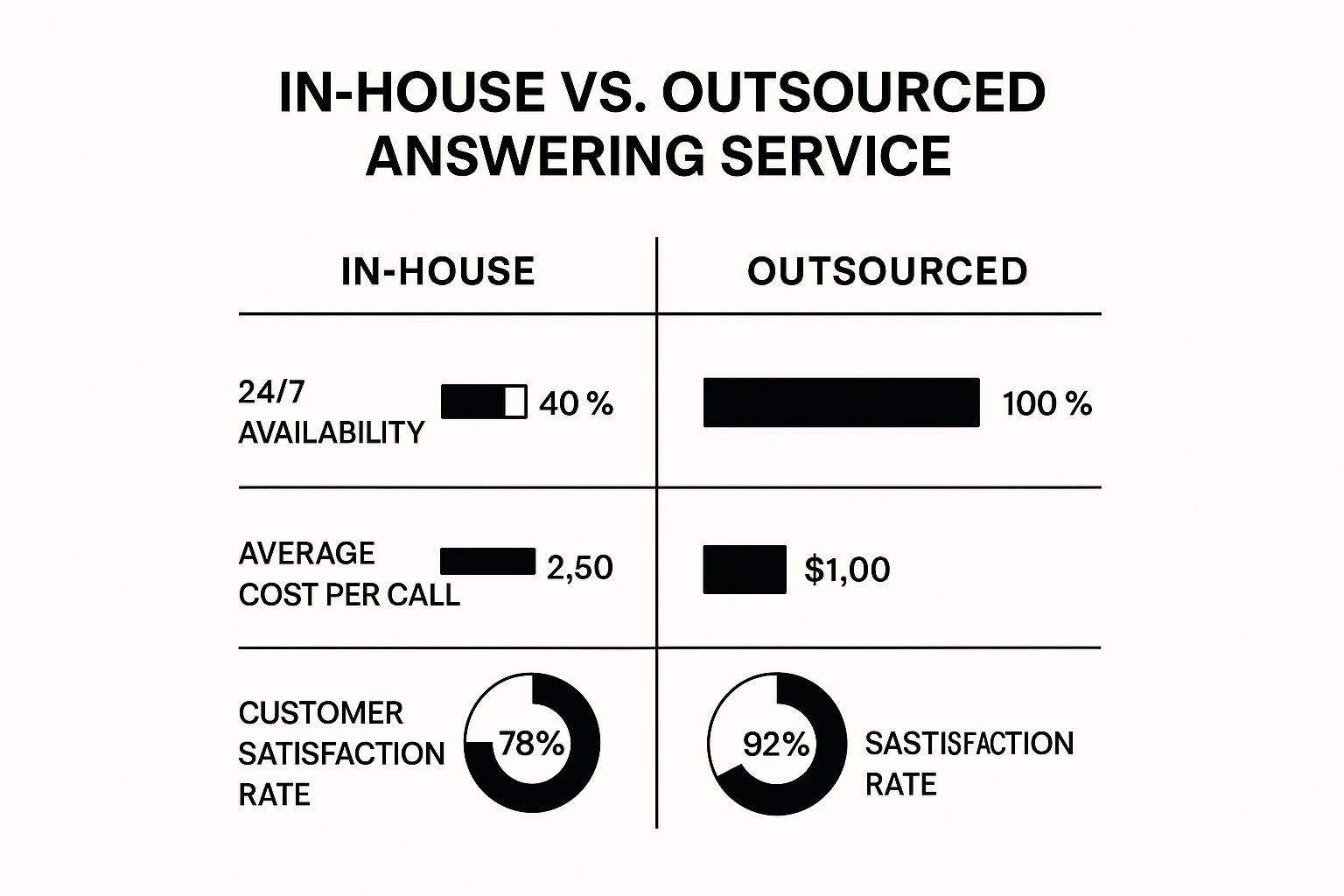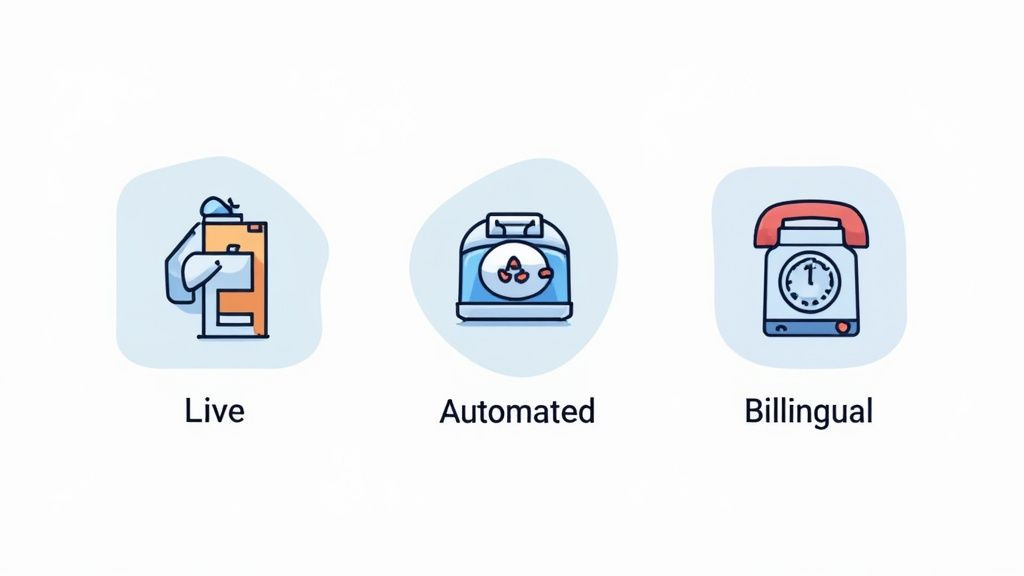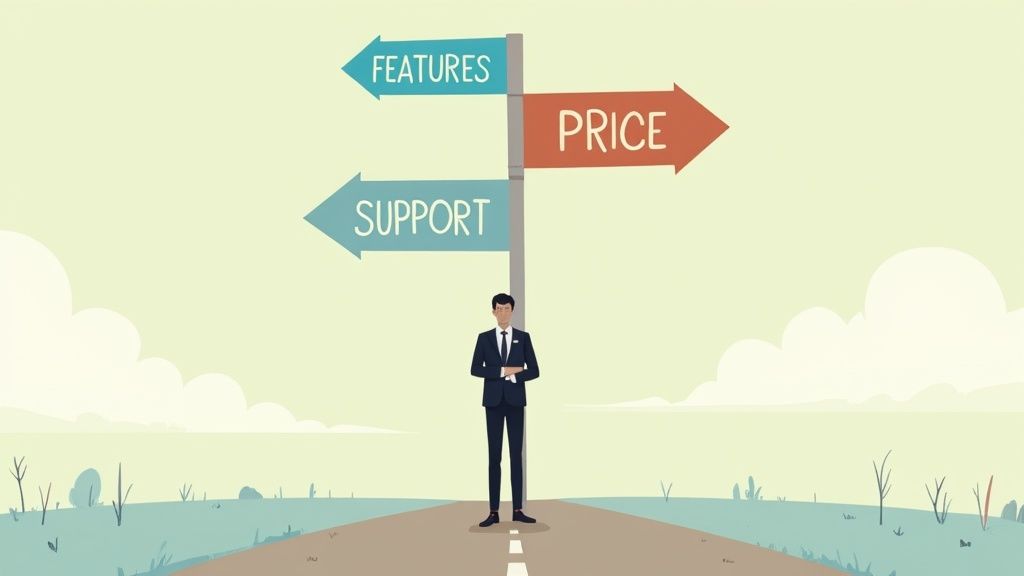Imagine having a front desk that never misses a call, even long after you’ve locked up for the night. That’s the simple idea behind a business answering service.
How A Business Answering Service Actually Works

Think of an answering service as your company’s digital front desk, an extension of your team that works around the clock. When you partner with one, you’re not just hiring someone to pick up the phone; you’re putting a sophisticated system in place designed to represent your brand professionally, 24/7.
The setup is surprisingly straightforward. You start by setting the rules for how calls are handled. Maybe you want all your calls forwarded, or perhaps only the ones that come in after hours. You can even set it to catch the overflow calls your team can't get to during a sudden rush. This process, called call forwarding, instantly reroutes incoming calls from your business line to a trained agent at the service.
It All Starts With Your Custom Script
Now, the agent who answers isn't just winging it. They use a custom script you create, packed with key details about your business, answers to common questions, and specific instructions for different scenarios. This makes sure every caller gets consistent, accurate information that sounds like it’s coming directly from you.
The magic of this system is how it turns a simple phone call into a productive action. The agent becomes a seamless part of your operation, handling all sorts of tasks.
To give you a clearer picture, here’s a breakdown of the core jobs a good answering service can take off your plate:
| Function | Description | Benefit |
|---|---|---|
| Lead Capture | Gathers contact info and service needs from new prospects. | Never miss a potential new customer again, even after hours. |
| Appointment Setting | Books, confirms, or reschedules appointments in your calendar. | Fills your schedule without you lifting a finger. |
| Urgent Call Dispatch | Identifies emergency calls and forwards them to on-call staff. | Ensures critical issues are handled immediately, day or night. |
| Message Taking | Records accurate, detailed messages for follow-up. | Frees up your team to focus on their primary tasks. |
This table just scratches the surface, but it shows how these services are built to do more than just answer calls—they're designed to drive your business forward.
The real value is in creating a seamless experience. Your caller often has no idea they’re speaking with a third-party service. They just feel heard and helped, which builds immediate trust in your business.
From Call to Action
After the agent handles the call based on your script, the final step is getting that information back to you. The message, lead details, or appointment confirmation is delivered almost instantly via email, text, or your preferred app.
This closed-loop system ensures you never lose a lead or miss a critical customer issue. Every answered call becomes a potential opportunity. This entire process is really the heart of what is an answering service and where it proves its worth.
This level of usefulness has turned the industry into a quiet giant. In the United States alone, the answering service market pulls in about $2.5 billion in annual sales, showing just how vital it has become for modern businesses.
Live Agents vs. AI Answering Services
When you’re looking into an answering service today, you’re essentially choosing between two very different approaches: the empathy of a real person or the raw efficiency of an automated system. This isn't just a tech decision. It's a choice that directly shapes your customer experience, your budget, and how people perceive your brand.
To find the right fit, you first have to really understand what sets live agents and AI solutions apart. Each has its own sweet spot, depending on what your customers need, how many calls you get, and how complicated those calls usually are.
The Power of the Human Touch
Live agent answering services are exactly what they sound like—they’re all about human interaction. When someone calls your business, they get a real person on the other end, someone who's been trained to follow your specific instructions and scripts. That human element is simply irreplaceable when you're dealing with complex, emotional, or high-stakes problems.
Think about it. A customer calls your plumbing company in a full-blown panic because a pipe just burst. A live agent can do more than just scribble down a message. They can offer genuine reassurance, calmly pull out the critical details, and get your on-call tech dispatched right away. That ability to show empathy and turn a crisis into a calm, controlled situation is how you build serious trust and loyalty.
The Rise of AI Efficiency
On the other side, you have AI answering services. These systems use conversational AI to talk with callers, knock out routine tasks, and pass along information. Their biggest selling points are speed, 24/7 availability, and lower costs. This makes them a fantastic option for businesses that field a lot of calls with predictable questions.
An AI really shines when it comes to things like booking appointments, answering the same few questions over and over, or collecting basic info to qualify a lead. For a towing company, an AI can instantly grab a caller’s location and car details, making sure no call gets dropped, even if it comes in at 3 a.m.
The move toward this kind of automation is undeniable. It's predicted that 80% of companies around the world will have integrated AI like chatbots into their customer service. You can dig into more data on AI adoption in customer service to see just how strong this trend is.
Key Takeaway: This isn't really about "human vs. machine." It's about matching the tool to the job. If your customer interactions are complex and high-value, you probably need a human. If they're routine and high-volume, AI is built for that.
This image breaks down some key metrics when comparing outsourced services to keeping everything in-house.

As the data shows, outsourcing often wins on availability and cost, but the quality of the customer experience can swing wildly depending on the provider you choose.
Comparing Your Options Side-by-Side
Choosing between a human or AI service comes down to your priorities. Do you value emotional intelligence and flexibility, or are speed and cost-efficiency your main goals? This table breaks down the core differences to help you see which path aligns better with your business.
| Feature | Human Answering Service | AI Answering Service |
|---|---|---|
| Customer Interaction | Empathetic, nuanced, and can handle complex emotional situations. | Fast, consistent, and ideal for routine, predictable tasks. |
| Complexity Handling | Excellent at problem-solving and navigating unique inquiries. | Limited to pre-programmed scripts and known scenarios. |
| Availability | Typically 24/7, but may involve different agents across shifts. | Always on, 24/7/365, with no breaks or shift changes. |
| Cost | Higher, based on agent time (per-minute or per-call plans). | Lower, often a flat monthly fee or based on usage volume. |
| Scalability | Can be slower to scale; requires hiring and training new agents. | Instantly scalable to handle any call volume without delay. |
| Best For | High-value interactions, urgent support, and building relationships. | Appointment booking, lead capture, and FAQs. |
At the end of the day, a human service provides a depth of understanding that AI can't replicate, making it perfect for industries where trust and personal connection are paramount. An AI service, on the other hand, offers unparalleled efficiency for businesses looking to automate high-volume, straightforward communication.
Finding the Best of Both Worlds
Luckily, you don't always have to make an all-or-nothing choice. Many of the best providers today offer a hybrid model that gives you the best of both. In a setup like this, an AI might be the first point of contact, handling the simple stuff, but it knows when to seamlessly hand the call over to a live agent for anything more complicated.
This balanced approach works beautifully:
- AI handles the volume: It answers every single call right away and takes care of the easy tasks.
- Humans handle the complexity: Your expert agents jump in for nuanced conversations, complaints, or anything urgent.
An integrated system gives you the cost-effectiveness of AI without giving up the critical problem-solving skills and empathy that only a human can bring to the table. It’s all about making sure every caller gets exactly the right kind of support, every single time.
The Real-World Benefits for Your Business

Alright, let's move past the theory. What does an answering service actually do for your business day-to-day? The impact is real, tangible, and shows up right on your bottom line. It’s about turning missed calls into captured revenue and trading administrative headaches for genuine growth opportunities.
One of the first things you'll notice is a huge leap in your customer experience. When a potential customer calls—especially with an urgent problem—getting dumped into voicemail is the fastest way to lose them forever. An answering service guarantees every single call is met by a prompt, professional, and helpful human being, making callers feel heard and valued from the get-go.
This isn't just a "nice-to-have." It has a massive financial impact. Poor customer service costs U.S. businesses an estimated $75 billion every year. By ensuring you provide top-tier, immediate support, you're not just protecting your revenue; you're building a rock-solid reputation for reliability. You can dig into the financial cost of bad customer service on Amplifai.com to see the full picture.
Improve Your Team's Productivity and Focus
When you hand off call management, you free your in-house team from the tyranny of the ringing phone. Instead of constantly juggling incoming calls with their actual jobs, your staff can finally concentrate on the high-value work that truly drives your business forward.
Picture a skilled HVAC technician completing a complex installation without having to stop every fifteen minutes to answer scheduling questions. This kind of focused work means fewer mistakes, faster job completion, and frankly, happier employees. Your team gets to do what they do best, while the answering service expertly handles the front lines.
The key shift: An answering service transforms call handling from a reactive, disruptive task into a proactive, streamlined system that supports your primary business goals.
Achieve Significant Cost Savings
Hiring a full-time, in-house receptionist is a lot more than just a salary. You're also on the hook for payroll taxes, benefits, vacation pay, training, and equipment. When you add it all up, the true cost of another employee can be staggering.
An answering service provides a much more flexible and cost-effective path. You only pay for the service you actually use—whether that's a per-minute rate or a simple monthly fee—and you sidestep all the overhead of a full-time hire. This makes professional-grade call handling totally accessible, even for small shops and solo operators.
Turn Every Hour into a Business Opportunity
Your shop might close at 5 PM, but your customers' problems don't clock out. An answering service gives you 24/7 availability, ensuring you never miss a hot lead simply because it came in after hours, on a holiday, or over the weekend.
For any service-based business, this is an absolute game-changer:
- Emergency Plumbers: You'll actually capture that midnight call about a burst pipe.
- Towing Companies: You can secure the roadside assistance request at 3 AM.
- Locksmiths: You'll be the first to respond to a weekend lockout.
This round-the-clock coverage turns your phone line into a constant source of revenue. You start capturing the urgent, high-value jobs your competitors are sleeping on. What was once a source of lost opportunities becomes a powerful engine for growth.
How to Navigate Answering Service Pricing
Figuring out how answering service providers charge for their work can feel a bit like reading the fine print on a new phone plan. If you pick the wrong one, you either end up with surprise overage fees or you’re stuck paying for a mountain of minutes you never even touch. The goal is to land on a model that fits your call volume like a glove and keeps your budget predictable.
Most pricing plans fall into a few common buckets. Each one is built for a different kind of business, from the startup with unpredictable call flows to the established company with a steady stream of inquiries. Knowing the difference is the first step to making a smart, cost-effective choice.
Pay-Per-Minute Plans
The most straightforward model is pay-per-minute. Just like it sounds, you get a bill for the exact amount of time an agent spends on the phone handling your calls. This is a fantastic option for businesses whose phones are quiet one month and ringing off the hook the next—think of an HVAC company that’s slow in the mild spring but gets slammed during a summer heatwave.
This approach gives you maximum flexibility. You only pay for what you use, which makes it perfect for startups or any business just dipping its toes into the answering service world to see what it can do. If you're curious about this model, it’s worth looking at how pay-as-you-go pricing for AI assistants can be surprisingly affordable.
Monthly Flat-Rate Packages
For businesses with a more predictable rhythm to their call volume, a monthly flat-rate package offers welcome stability. You pay a set fee each month for a specific number of minutes or calls, almost like a subscription.
This is the go-to for established businesses that have a good handle on their monthly call load, like a busy law firm or a multi-practitioner medical office. The biggest win here is that you know exactly what your bill will look like every month, which makes budgeting a whole lot simpler.
Key Consideration: Always, always ask what happens if you go over your monthly limit. Some services hit you with a steep per-minute overage rate, while others might just bump you up to the next plan. Finding this out upfront is critical to avoiding a nasty surprise on your invoice.
Tiered Bundles and Hybrid Models
Many providers now offer tiered bundles that package a set number of minutes with other useful features. These plans are designed to give you more bang for your buck as your business grows.
For example, you might see tiers like this:
- Basic Tier: Could include 100 minutes for simple call handling and message taking.
- Mid-Tier: Might offer 300 minutes plus extras like appointment scheduling and basic CRM integration.
- Premium Tier: May provide 1,000 minutes, along with specialized services like bilingual support and advanced call routing.
These bundles let you pick a plan that lines up with exactly what you need right now, so you’re not paying for fancy features you’ll never use. This structure brings professional call handling within reach for everyone, from a solo plumber to a sprawling service franchise. At the end of the day, the right pricing model is the one that gives you reliable, professional coverage without breaking the bank.
How to Choose the Right Answering Service

Picking the right answering service isn't about finding the universally "best" one. It's about finding the right partner for your business. The service that’s a perfect match for a local law firm would be a terrible fit for an emergency towing company, and vice-versa.
Think of this process like hiring a key employee. You need a structured approach to make sure you find a provider that acts as a true extension of your brand. It all starts with an honest look in the mirror. Before you even Google a single company, you have to define exactly what you need a service to do.
This initial clarity is your compass. It will guide you to the right solution and stop you from paying for bells and whistles you'll never use.
Define Your Actual Needs
First things first: outline your non-negotiables. You're basically creating a job description for your ideal service. The more detailed you get here, the less time you'll waste later.
Start by asking yourself some basic questions:
- What's my real call volume? How many calls do you actually get per day or week? Are there predictable busy seasons, like a tax preparer in April or an HVAC company in July? Be honest.
- What kind of calls are they? Are people mostly trying to book appointments? Are they urgent dispatch requests? Or just general questions about your hours? The nature of the call matters.
- Do I need specialized compliance? If you're in the medical world, HIPAA compliance is absolutely mandatory. No exceptions. Law offices and financial firms have their own strict data security rules, too.
- What are my hours? Do you need true 24/7/365 coverage for genuine emergencies, or are you just looking to cover nights and weekends?
Having straight answers to these questions will narrow your search dramatically. For example, if you find out most of your after-hours calls are just simple appointment requests, you might realize an AI answering service can handle that volume perfectly and save you a bundle.
Research and Vet Your Potential Providers
With your needs clearly defined, it's time to start looking at providers. Don't just take their marketing promises at face value. You need to dig deeper and find proof they understand your industry and its specific headaches.
Look for case studies or testimonials from businesses like yours. A provider that proudly talks about its success with plumbers and electricians is far more likely to get the urgency of a "burst pipe" call than a generic, one-size-fits-all service. And don't forget to check third-party review sites to see what real customers say about their reliability and agent quality.
Pro Tip: When you're reading reviews, pay special attention to comments about script adherence and agent professionalism. This is where a service proves it can represent your brand the way you would.
Confirm Your Tech Integration
A modern answering service has to play nice with the tools you already use. If it just creates more manual data entry for you or your team, it’s defeating the whole purpose.
Make a simple list of your essential software. This includes your CRM (like Salesforce or HubSpot), your scheduling calendar (like Google Calendar or Calendly), and any dispatching platforms you rely on.
When you talk to potential providers, make sure they can integrate directly with this tech stack. You want appointments booked straight into your calendar and new lead info logged automatically in your CRM. This automation isn't just a nice-to-have; it's a core benefit that saves you hours and cuts down on human error.
Ask Critical Questions During the Demo
Once you've got a shortlist of a few solid contenders, it’s time to schedule a demo or a consultation call. This is your chance to get past the sales pitch and ask the tough questions.
Come prepared with a list. Don't be shy.
- Agent Training: How, specifically, do you train your agents on my business and my script? What does the ongoing training look like?
- Data Security: What concrete measures do you take to protect my customers' data? Are you HIPAA compliant? Can you prove it?
- Performance Reporting: What kind of reports can I expect? Will I be able to see call volume, average call duration, and listen to call recordings?
- Customization: How quickly and easily can I change my script or update my on-call schedule if something changes?
Choosing who handles your front-line communication is a major business decision. It's not something to rush. By taking this structured approach, you can confidently find a service that truly aligns with your goals and helps you capture every single opportunity that comes your way.
Common Questions About Answering Services
Alright, so you get the general idea of an answering service. But when you start thinking about how it would actually work for your business, the practical questions pop up. It's smart to dig into the details—it's the only way to know if this is the right move for your company.
Let's walk through some of the most common questions we hear from business owners.
Will An Answering Service Sound Like My Own Staff?
Absolutely, and that’s the whole point. A top-notch answering service blends in so well that your callers should never guess they’re talking to a partner. They just think they’ve reached a helpful, professional member of your team.
How? During setup, you're not just handing over a phone number. You're building a knowledge base for them. You’ll provide custom scripts, need-to-know info like your hours and locations, and a playbook for answering your most frequent questions. The agents then get trained on your company’s vibe, ensuring every single call feels authentic and true to your brand.
What's The Difference Between An Answering Service And A Virtual Receptionist?
Good question. People often use these terms interchangeably, but there's a real difference in scope. Think of it as the difference between a specialist and a generalist.
-
Answering Service: Their main job is to be the expert on your phone lines. They focus on answering incoming calls, taking dead-on accurate messages, and getting urgent information to the right person, exactly how you've instructed.
-
Virtual Receptionist: This role usually covers everything an answering service does, but then adds more administrative tasks to the mix. They might schedule appointments directly into your calendar, make outbound calls for you, or do some initial lead qualification.
An answering service ensures you never miss a call. A virtual receptionist acts more like a remote member of your front-office team.
How Do I Get My Messages From The Answering Service?
You get them however you want them, whenever you want them. Any decent answering service knows that a message is useless if it doesn't get to you fast and in a format that works for your daily routine.
You can usually pick and choose from a few options:
- Instant Alerts: Messages land in your inbox or as a text message the second the call ends.
- Daily Digest: Get a single, clean report of all the day's calls sent to your email at a set time.
- Secure Portal: Log into a web dashboard or mobile app anytime to see call logs, read messages, and even listen to recordings.
- Direct CRM Logging: The best services can plug right into your existing business software, automatically dropping call details and lead info right where you need it.
Is An Answering Service Secure For Sensitive Information?
It has to be. Professional services—especially those working with healthcare, legal, or financial clients—treat data security as a top priority. They know that protecting your customers' sensitive information is completely non-negotiable.
Reputable providers are often HIPAA compliant, which is a legal requirement for handling protected health information (PHI). They use tools like data encryption and secure servers, plus have strict internal rules to make sure your business and your clients are protected. Always ask about a provider’s security credentials before you sign on.
This focus on security is what allows medical practices, law firms, and financial advisors to use these services with total confidence, knowing every call meets strict industry privacy standards.
Ready to see how an AI-powered answering service can capture more leads and free up your time? Marlie Ai provides instant, 24/7 call coverage so you never miss an opportunity. Get started in minutes and see the difference.

